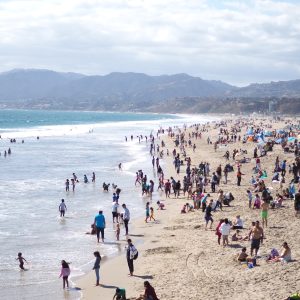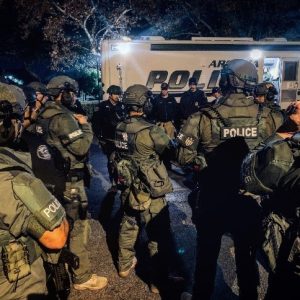 View Winners →
View Winners → Possible Millionaire Tax on Ballot to Combat Homelessness


The Los Angeles Homeless Services Authority estimated a population of about 46, 874 homeless people on city streets at night. – Photo by Terry Miller
By Annette Semerdjian
The Los Angeles County Board of Supervisors will pursue a ballot to tax millionaires in order to fund programs that help the city’s growing homeless population.
On May 17 the vote was cast to reach Governor Jerry Brown and ask Sacramento officials to change the state law in order to grant Los Angeles County access to taxing personal incomes.
The Los Angeles Homeless Services Authority announced a 5.7 percent increase in homelessness from last year. They estimated a population of about 46, 874 homeless people on the streets at night.
The vote was 3-2 at last week’s board meeting. Supervisor Hilda L. Solis and Don Knabe motioned to use existing funding in a more fiscally responsible way, funding mental health science, substance abuse treatment, and employment for the homeless.
Solis and Knabe’s motion for examining the board’s allocation of funds in regards to aid for homelessness passed and the board will soon review how money is spent combating homelessness.
Supervisor Mark Ridley-Thomas pushed for the state law change in order to put the millionaire tax on the ballot. “It won’t get better unless we have a significant intervention,” he said. “Each member of this board has said repeatedly that one-time funding isn’t sufficient. Now it’s time to get on with the rigorous exploration of the kind of funding that would be necessary,” Ridley-Thomas said in last week’s board meeting.
Another compelling speaker was Ed Bernard, a homeless man who benefits from non-profits such as Sanctuary of Hope South Los Angeles. “I just want to continue to get that support for homeless youth and also the homeless around LA County,” said Bernard.
The Sanctuary of Hope in South Los Angeles has raised student GPAs from 2.6 to 2.86, on average, and has a 90 percent enrollment rate to college or vocational programs for its beneficiaries. They also noticed an 83 percent increase in income through financial aid, benefits, and employment of the program’s participants.
This non-profit, like many others, would continue its success with homeless youth if the millionaire tax is put on the ballot and passed. According to the Sanctuary of Hope, half of the population of homeless people is younger than 30 years old.
Supervisors Don Knabe and Mike Antonovich voted against the initial push to Sacramento for allowing the millionaire tax to be on the ballot. Antonovich instead proposed funding towards addressing mental health of the homeless, not more housing.
Taking money from other taxes are also options to fund the efforts against homelessness. One option is to use funds generated by the parcel tax, which is a property tax that aids public education and other government services. Another is to withdraw from Measure B, which funds trauma centers for medical emergencies and response to bio-chemical terrorism. Taxing marijuana will also be considered.
The measure would tax income earners of over $1 million per year, which will bring Los Angeles County about $243 million in funding for combating homelessness. If the measure reaches the November ballot, it is up to the voters to approve it by at least two-thirds.











































































































